|
|
|
Sort Order |
|
|
|
Items / Page
|
|
|
|
|
|
|
| Srl | Item |
| 1 |
ID:
131147
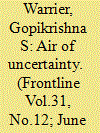

|
|
|
|
|
| Publication |
2014.
|
| Summary/Abstract |
Environment minister Prakash Javadekar will not have to worry about pressures from alliance partners. But one does not know how much space he is willing to carve out for himself and how much space the government is likely to give him.
|
|
|
|
|
|
|
|
|
|
|
|
|
|
|
|
| 2 |
ID:
132536
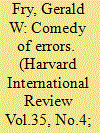

|
|
|
|
|
| Publication |
2014.
|
| Summary/Abstract |
Political crises are nothing new for Thailand. Since becoming a constitutional monarchy in 1932, the country has faced numerous political crises, including a 1973 student revolution to overthrow a military dictatorship, the storming of Thammasat University and the installation of an extremely right-wing government in 1976, and the people power victory over General Suchinda in 1992. In September 2006, a military coup deposed the former prime minister, Dr. Thaksin Shinawatra. In retaliation against the coup, Thaksin supporters in 2006 formed the United Front for Democracy against Dictatorship (UDD), a political pressure group whose supporters are commonly called Red Shirts.
|
|
|
|
|
|
|
|
|
|
|
|
|
|
|
|
| 3 |
ID:
125277
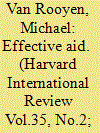

|
|
|
|
|
| Publication |
2013.
|
| Summary/Abstract |
Humanitarian assistance is aimed at providing rapid, life-saving support in settings of high population vulnerability, such as in times of war, disaster, or displacement. The provision of humanitarian assistance is complicated by severe access restrictions, large-scale emergency needs, displaced populations, and complex political and social settings. Both war and disasters create, and often amplify, existing economic disparities and contribute to an environment in which gender inequities, human vulnerabilities, and human rights abuses are likely to be exacerbated. The emergency response to large-scale humanitarian emergencies such as the 2010 earthquake in Haiti creates a sense of public urgency and political pressure to intervene. The last decade has seen significant advances in the standardization and coordination of relief and development activities, including improved mechanisms for coordination and accountability. While these efforts provided a solid basis for improved efficiency, they have faltered in recent large-scale crises. As the global relief and development community contemplates the next decades of humanitarian operations, a few essential questions should be raised: What are the most important barriers to providing effective aid? What future issues must be understood to optimize the efficiency of aid? What is the cost of inaction and what are the ramifications of not changing the system? This article will focus on some of the factors contributing to ineffective humanitarian aid and discuss the progress toward humanitarian reform, including the need for professionalism, coordination, and accountability.
|
|
|
|
|
|
|
|
|
|
|
|
|
|
|
|
| 4 |
ID:
129839
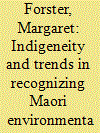

|
|
|
|
|
| Publication |
2014.
|
| Summary/Abstract |
Valuing indigeneity is a recent phenomenon despite a long tradition in Aotearoa New Zealand of mechanisms that recognize Maori rights and interests. Political pressure to acknowledge indigeneity has been a prerequisite to greater recognition of Maori rights and interests in environmental policy. Maori involvement is now a feature of the state resource management system; however, more substantive forms of power-sharing is sought to secure tribal authority, to reaffirm Maori culture, and to ensure that land continues to shape the identity of Maori people.
|
|
|
|
|
|
|
|
|
|
|
|
|
|
|
|
| 5 |
ID:
129101


|
|
|
|
|
| Publication |
2014.
|
| Summary/Abstract |
The recent land use policy ol' "landing the l')eere;tse in Rural ('onxtrttelion Land with the Increase in L.'rh:tn ("onxtruetion l.and" i.\ an attempt of the government to address the tensions between protecting arable land and providing land lior construction by means of more intensive use of land. Nevertheless. the implementation ol" the policy has triggered notch controversy. in particular about predominant dependence upon retrial residential land totes consolidation and the pursuits of rural~ urban construction land quota transfer. Although local governments often take the blame for these issues. the case study of the comprehensive land consolidation project in Gull reveals the type of dilemma with which they are confronted. [t is shown that the potential for land consolidation is limited. whereby local governments have to turn to rural residential land consolidation to achieve the targets set by the central government for land consolidation. Furthennorc. the displacement and resettlement of rural dwellers puts tremendous financial pressure upon the local government. and it would be impossible to implement the central government mandate to build a new socialist countryside without selling land at a higher price. This article discusses the possibilities for a market-led land consolidation process and concludes that the targets of land consolidation and the implementation of the linking policy should \-'ar_v from region to region to match local levels of economic development and specifieities of the rural economy.
|
|
|
|
|
|
|
|
|
|
|
|
|
|
|
|
| 6 |
ID:
137419
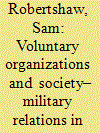

|
|
|
|
|
| Summary/Abstract |
The 2014 crisis in Ukraine has refocused attention on Russia as a European security actor. Despite showing renewed military capability, compared to the post-Soviet period, Russian society–military relations have remained the same. This relationship (between society and the security organs) provides the key context for assessing security. Analysis of everyday militarization and the role of voluntary organizations (such as DOSAAF [Dobrovol'noe obshchestvo sodeistviya armii, aviatsii i flotu] and Nashi [Molodezhnoe demokraticheskoe antifashistskoe dvizheni]) in supporting the military can provide an important insight into Russian behaviour as a security actor. These organizations generate a pro-military outlook and at the same time provide training and activities, thus contributing to military effectiveness by developing the competency of young people prior to military service as well as increasing public knowledge of military affairs. However, strong support for the military, a lack of independent information, and an absence of a shared vision on how society–military relations should be developed and also represent political challenges in terms of everyday militarization. This dynamic is important for understanding both Russia's security posture and wider security implications for Europe.
|
|
|
|
|
|
|
|
|
|
|
|
|
|
|
|
|
|
|
|
|